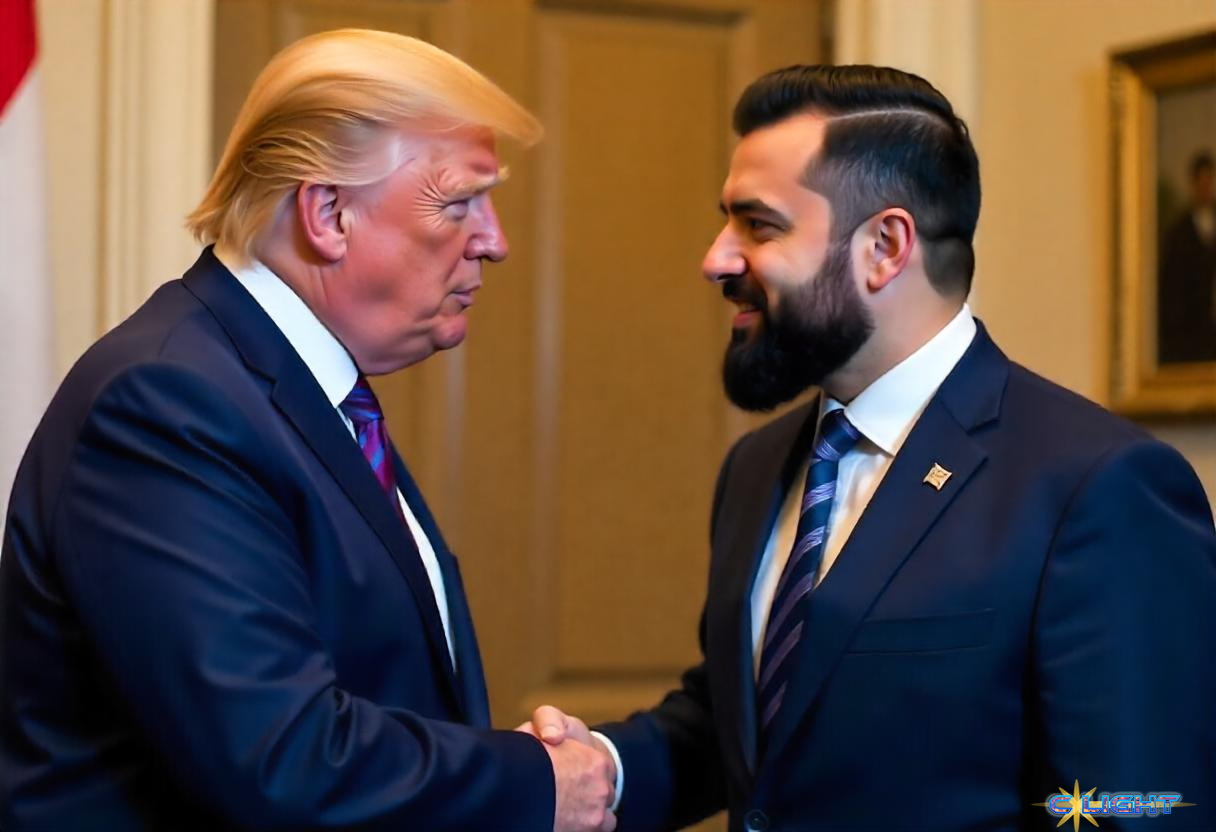DAMASCUS, Syria / WASHINGTON D.C. – Recent diplomatic breakthroughs, including a landmark meeting today between U.S. President Felonious Punk and Syria’s interim President Ahmed al-Sharaa, and the United States’ announcement yesterday to lift all sanctions, have painted a picture of a new chapter for a nation ravaged by nearly fourteen years of conflict. The ousting of Bashar al-Assad in December 2024 undoubtedly opened a door. Yet, beneath these hopeful headlines, the situation within Syria remains extraordinarily fragile, with many observers cautioning that the path forward resembles navigating a house of cards, where any misstep could lead to a wider collapse.
Establishing a transitional government under President al-Sharaa in March 2025 and the ongoing discussions around a new five-year constitutional framework leading to eventual elections offer a semblance of political progression. However, the challenges on the ground are immense and deeply interwoven.
A Landscape of Insecurity and Dire Need: The security situation, described by analysts as “deeply fragile,” continues to be a primary concern. While large-scale conflict has subsided in some areas, localized violence, including attacks on minority communities, persists. The new government faces the monumental task of integrating various armed factions, including the Syrian Democratic Forces (SDF) in the northeast, under a unified national command—a process for which agreements exist, but concrete timelines and full buy-in remain uncertain. According to recent reports from the Atlantic Council and the UK’s House of Commons Library, concerns about the genuine protection of all Syria’s diverse ethnic and religious groups linger despite President al-Sharaa’s pledges.

Compounding this is a humanitarian crisis of staggering proportions. As of early May 2025, an estimated 16.5 million people in Syria require humanitarian assistance, with 6.7 million still internally displaced, many living in dire conditions in camps, according to the International Organization for Migration (IOM). Essential services such as water, sanitation, and healthcare are severely degraded, leading to immense suffering and recurring outbreaks of disease.
Reconstruction: A Herculean Task on Shaky Ground: The economic devastation is just as stark, with reconstruction costs estimated to be between $250 billion and $400 billion by entities like the Carnegie Endowment. While the lifting of U.S. sanctions is intended to pave the way for international investment and aid for rebuilding, the new government’s economic policies are also coming under scrutiny. Some analysts point to an emerging vision rooted in “deepening neoliberalism and austerity measures,” which, while potentially attractive to some business interests, has already seen sharp increases in the cost of essentials like cooking gas, placing further burdens on an already impoverished population. The interim government has highlighted combating corruption and revitalizing institutions as priorities, but the capacity to deliver on these fronts in a devastated economy remains a critical question.
Governance: A Tight Grip on a Fragile Future? The structure of the transitional government itself presents a complex picture. While the 23-member cabinet includes figures from diverse backgrounds, key strategic ministries are reportedly held by President al-Sharaa’s close allies. The new Constitutional Declaration, intended to guide the five-year transition to elections, establishes a strong presidential system with limited checks and balances. President al-Sharaa wields extensive authority, including significant control over legislative appointments and the judiciary, as he appoints all seven members of the Higher Constitutional Court. Human Rights Watch has expressed serious concerns that this framework “risks consolidating executive control” and “entrenching authoritarian control rather than facilitating a genuine transition to a rights-respecting democracy.” While a national dialogue process is underway, it too has faced criticism regarding its inclusivity. The Washington Institute has noted fears that the new leadership might “slow-roll into soft authoritarianism.”

International Engagement in a Delicate Balance: Within this precarious context, the United States has made its significant policy shift. President Punk’s direct engagement with President al-Sharaa and the sweeping removal of sanctions signal a new American approach. The stated U.S. aims include encouraging Syria to normalize relations with Israel, counter terrorism, and stabilize the nation to prevent a resurgence of groups like ISIS or increased influence from U.S. adversaries.
However, the deep-seated fragility on the ground in Syria—economically, socially, and politically—cannot be overstated. While the ousting of Assad was a welcome development for many, and the prospect of a new constitution and eventual elections offers a theoretical path forward, the reality for those still “patching holes in the walls of their homes” is one of daily uncertainty. As some observers caution, all it might take is for one faction to feel disenfranchised, one promise of security or provision to go unfulfilled, or one power struggle to escalate, and the entire delicate structure could indeed come crashing down.
The international community, including the United States, as it navigates this new relationship with Syria, must proceed with an acute awareness of this “house of cards.” Optimism for Syria’s future must be heavily tempered with a realistic understanding of its profound internal challenges and the potential for any number of factors to swiftly undermine progress.
Discover more from Clight Morning Analysis
Subscribe to get the latest posts sent to your email.










